Your cart is currently empty.
Salesforce is a cloud-based customer relationship management (CRM) platform that provides a suite of tools and services to help businesses manage their relationships and interactions with customers and prospects. Salesforce is known for its flexibility, scalability, and user-friendly interface, making it a popular choice for organizations of all sizes and industries. Salesforce is widely used across various industries, including sales, marketing, customer service, finance, and more. The platform's cloud-based architecture means that users can access their data from anywhere with an internet connection, promoting collaboration and flexibility within organizations.

Online-Classroom
3 Months Duration
Live Class Facilities
Interviews Assured
Live Server
Salesforce is like a powerful toolbox that businesses use to manage their relationships with customers. What makes it special is that it's not a software you install on your computer; it's all on the internet. This means you can access it from anywhere, anytime, as long as you have an internet connection. At its core, Salesforce is a CRM system. CRM is like a super-smart address book that helps businesses keep track of all their customers and the interactions they have with them. It's like having a personal assistant for managing relationships.
Contact and Account Management
Salesforce helps companies organize and keep track of their customers, leads, and business accounts all in one place.
Opportunity Management
It helps in managing the sales process by tracking potential deals from the first contact to closing the sale.
Workflow Automation
Salesforce automates repetitive tasks and processes, making work more efficient and less prone to errors.
Reports and Dashboards
Users can create visual reports and dashboards to quickly see how well things are going, like how many deals are in progress or how effective a marketing campaign is.
Email Integration
It seamlessly connects with email, making it easy to keep track of important communications with customers.
Marketing Automation
Salesforce can help plan, execute, and track marketing campaigns, ensuring that businesses reach the right audience with the right message.
A good Salesforce training program covers a wide range of topics, from basic concepts to advanced features. It should include modules on Sales Cloud, Service Cloud, Salesforce Administration, Development, and more.
Trainers with real-world experience and Salesforce certifications can provide valuable insights and practical knowledge.
Practical exercises, hands-on labs, and real-world projects are essential for reinforcing theoretical concepts and gaining practical skills.
The training program should prepare participants for Salesforce certifications, providing guidance on exam content, structure, and strategies.
Look for programs that offer flexibility in terms of learning options, such as in-person classes, virtual classrooms, or self-paced online courses.
The training content should be up-to-date and aligned with the latest Salesforce features and industry best practices.
Access to resources, forums, or communities for ongoing support and networking after the training is completed.
Engaging and interactive materials, such as videos, quizzes, and simulations, can enhance the learning experience.
Some training providers offer career guidance, helping participants understand how to apply their Salesforce skills in the job market.
Regular feedback and assessments during the training can help participants track their progress and identify areas for improvement.
Training programs that facilitate networking among participants or provide access to a broader Salesforce community can be valuable for sharing experiences and insights.
Opportunities to work on real-world projects or case studies that mimic actual business scenarios can enhance the practical application of learned skills.
Some programs allow participants to customize their learning paths or specialize in specific Salesforce domains based on their career goals.
Training providers with recognition or partnerships with Salesforce can be an added advantage.
Via Salesforce Administrator,Responsibilities include configuring and customizing Salesforce to meet organizational needs. Manage user accounts, security settings, workflows, and data integrity.
Via Salesforce Developer,Develop and customize Salesforce applications using Apex (Salesforce's proprietary programming language) and Visualforce. Implement new features, integrations, and custom functionality.
Via Salesforce Consultant,Work closely with clients to understand their business requirements and provide solutions using Salesforce. Provide advisory services on best practices and Salesforce implementations.
Via Salesforce Architect,Design and architect complex Salesforce solutions that align with business needs. Provide technical leadership and expertise in Salesforce platform capabilities.
Via Salesforce Project Manager,Manage and oversee Salesforce implementation projects from initiation to completion. Coordinate with stakeholders, set project goals, and ensure successful delivery.
Via Salesforce Business Analyst,Analyze business processes and gather requirements to design Salesforce solutions. Bridge the gap between business needs and technical implementation.
Via Salesforce Quality Assurance (QA) Analyst,Test and ensure the quality of Salesforce implementations. Develop and execute test plans, identify and report defects.
Via Salesforce Marketing Cloud Specialist:,Focus on marketing automation and campaign management using Salesforce Marketing Cloud. Implement and optimize marketing strategies within the Salesforce platform.
Via Salesforce Lightning Developer:,Specialize in developing applications using Salesforce Lightning, the modern user interface framework. Create Lightning components and design user experiences.
Via Salesforce Integration Specialist,Specialize in integrating Salesforce with other systems and applications. Design and implement seamless data flows between Salesforce and external platforms.
Via Salesforce Solution Architect,Define overall system architecture and integration strategies for Salesforce implementations. Provide high-level guidance on technology choices and design patterns.
Via Salesforce Trainer/Instructor,Provide training to individuals or organizations on Salesforce functionality, development, and administration. Stay up-to-date with the latest Salesforce releases and features.
Via Salesforce Support Analyst,Provide ongoing support and troubleshooting for Salesforce users. Assist with user inquiries, issue resolution, and system maintenance.
Via Salesforce AI Specialist,Work with Salesforce Einstein, the AI capabilities of Salesforce, to implement and optimize AI-driven solutions. Leverage AI to enhance sales, service, and marketing processes.
Via Salesforce Industry Specialist (e.g., Financial Services Cloud Specialist):,Specialize in implementing Salesforce solutions tailored to specific industries or business verticals.